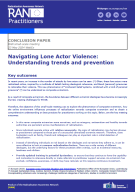Details
- Publication date
- 19 July 2024
- Author
- Directorate-General for Migration and Home Affairs
- RAN Publications Topic
- Lone actors
Description
In recent years, an increase in the number of attacks by lone actors can be seen. Often, these lone actors were radicalised online, inspired by a multitude of beliefs lacking ideological coherence, and blend (personal) grievances to rationalise their violence. This new phenomenon of “incoherent belief systems, combined with a kind of personal grievance” can be understood as composite extremism.
As a result of composite extremism, the boundaries between different extremist ideologies have become increasingly blurred, creating challenges for P/CVE.
Therefore, the objective of this small-scale meeting was to explore the phenomenon of composite extremism, how the online environment influences processes of radicalisation towards composite extremism and to obtain a comprehensive understanding on best practices for practitioners working on this topic.
Below, are the key meeting outcomes.
- In this newer composite extremism some narratives, such as misogyny, antisemitism and hostility towards authorities are persistent across manifestations of radicalisation.
- Since individuals operate online with relative anonymity, the signs of radicalisation may be less obvious to practitioners compared to those part of a structured centralised extremist network. Therefore, close bystanders such as family, friends and colleagues can play an important role in initial detection of radicalisation.
- Instead of identifying individuals at risk based on the ideologies and narratives they adhere to, it can be more effective to look at common radicalisation factors. There are a wide variety of different ideologies, but the underlying factors for these processes often overlap, such as existential insecurity, loneliness and nihilism.
- Provide updated training to potential bystanders, to ensure that they continue to have the capability and motivation to intervene directly or make referrals to practitioner support services. As extremism has evolved, confidence, awareness, or skills may have reduced, so this requires continuous investment.

